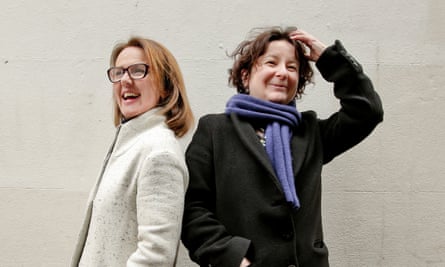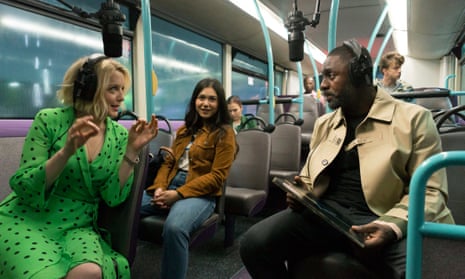It was an “upgrade” launched by the BBC with great fanfare at Tate Modern. The next day BBC Sounds, the broadcaster’s sparkling new audio app, even took over the London Eye – renamed the London Ear for that November day.
But just two months on, many listeners are unhappy with the app, and Jane Garvey, the Woman’s Hour presenter at the heart of that showcase event, has become a high-profile victim of the trendy new home for all of the BBC’s radio shows and music.
Confused listeners were already questioning why the BBC needed a replacement to its popular iPlayer radio service and anger boiled over last week when a successful and established podcast made by Garvey, with her fellow BBC radio presenter Fi Glover, was placed exclusively on the new app.
One typically indignant fan, Nigel Metheringham, tweeted: “Bring back (the podcast) #Fortunately to an open feed, rather than using it to prop up a shoddy service.”
The loss of this favourite podcast to anyone who downloads from other sites, such as iTunes, or for listeners living abroad, has now exposed much wider dissatisfaction with BBC Sounds, which is receiving low scores on app-rating sites. Criticism focuses on the lack of a sleep-timer function for Android devices, a failure to reliably display track names, the difficulty of sharing content, on claims the search function is ineffective, and on the limited menu of content from other podcast providers.
“I really wanted this to work, but there seems a lot wrong with it,” said Miranda Sawyer, the Observer’s radio and podcast critic. “Search terms that work easily on other apps don’t seem to work yet on BBC Sounds. And there really isn’t enough content from other places available either. It is not going to convince people to start listening to podcasts there.”
According to the BBC, its new app, which will replace iPlayer radio completely this year, has already attracted a million listeners with its special features, all better suited to smartphone downloading. These include personalised listening recommendations and the facility to remember where you are in a podcast or programme.
Explaining the new app last year, James Purnell, the BBC’s director of radio and education, said it was designed to reach younger listeners who did not tune into traditional radio output. Although the BBC still dominates the airwaves nationally, with its stations reaching more than 34 million people a week, only 3% of those under-35 were using the iPlayer catch-up radio app.

The BBC Sounds app is good at providing on-demand content, the corporation argues, and it is being improved by listener feedback. So far a specific drama category has been added and more updates are planned, including an in-car listening facility.
Garvey and Glover’s podcast series Fortunately… began two years ago and lets audiences eavesdrop on relaxed chats between the presenters and an array of guests. When its return this month was limited to BBC Sounds, complaints started coming in. The BBC’s arrogance was “breathtaking”, said one critic, while others judged the decision “bonkers – not good bonkers, bad bonkers”.
Listeners were so livid that Glover and the podcast’s commissioning editor, Rhian Roberts, were forced to respond. “I’ve been in touch with the @BBCSounds team to make them aware of all the feedback coming back on this thread,” Roberts wrote, later redirecting international listeners to the BBC website.
Glover simply asked listeners to keep faith, but fans such as Katherine Reil were not appeased. “Can’t believe @fifiglover & @janegarvey1 aren’t spitting tacks over this,” she responded. Garvey has since used Twitter to reassure fans that her first four podcast episodes will be made more widely available in a month.
“By now restricting it to Sounds you can’t listen to it outside of the country, so it simply stops being a podcast,” argued one regular and mystified BBC radio contributor this weekend. “I suppose the BBC output is paid for by the licence-fee payer, and therefore should only be available to them – but they have freely available output across the world, so that doesn’t exactly stand up to examination. It just makes them look grandpa trying to be hip with the kids but not quite getting there.”
At the time of the app’s launch the actor Hugh Bonneville, who played the BBC’s fictional head of values, Ian Fletcher, in the sitcom W1A, tweeted a satirical reply to a query about the purpose of BBC Sounds from the comedian Jenny Eclair.
“It’s a good question, Jenny, and we’re glad you’ve asked it,” Bonneville said. “Part of our More of Less initiative, BBC Sounds is a condensation of BBC Radio and BBC Noise, which in 2020 will be repurposed as BBC Echo – a great big empty hall, probably in Kidderminster.”
A BBC Spokesperson said: “Unlike iPlayer Radio, BBC Sounds is personalised and gives listeners the best radio, music and podcasts from the BBC where people want – increasingly on mobiles. We’re experimenting with releasing a limited number of podcasts first on BBC Sounds to help listeners discover more content from the BBC. And, as BBC Sounds is personalised, the more it’s used, the better it responds to listeners’ preferences and improves recommendations. The response to BBC Sounds has been overwhelmingly positive with over three quarters rating it as excellent or very good in independent research - however we’ll continue to improve it based on feedback.”
This article was amended on 20 January 2019 to include a statement from the BBC.
